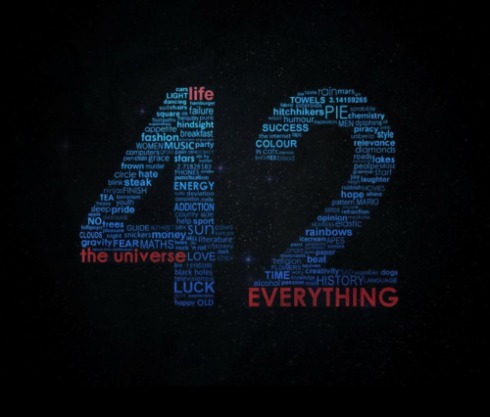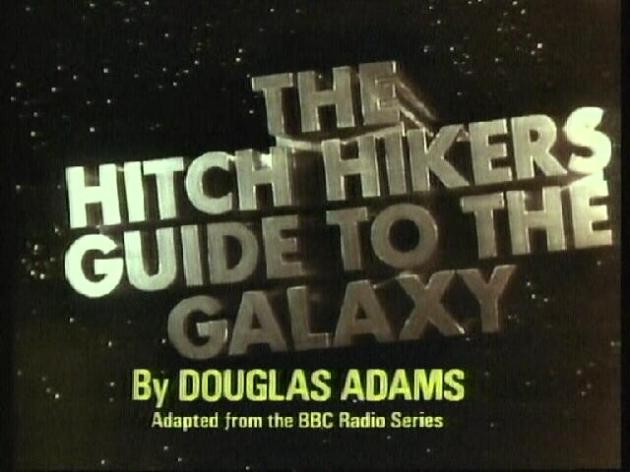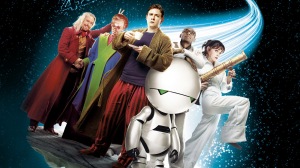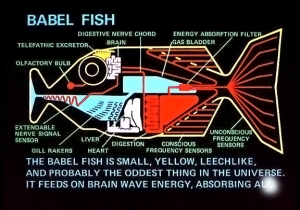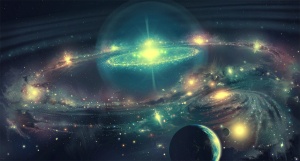“The mystery of human existence lies not in just staying alive, but in finding something to live for” – Fyodor Dostoyevsky.
For countless millennium, man has searched for some reason to live. Since the dawn of humanity, philosophers have spoken, poets have written, artists have drawn, scientists have studied, yet no one has given an answer to the burning question that plagues every self-aware being: What is the answer to life, the universe, and everything? It seemed no one had the answer, until The Hitchhiker’s Guide to the Galaxy came along and simply stated: “42”
Throughout the novel, The Hitchhiker’s Guide to the Galaxy by Douglas Adams, humor is often incorporated to question the roles and complexities of life in the universe. Is there a point to existence? Will mortal beings ever truly find the answers they look for? “What do I mean by who am I?” Yet among the humor and punch lines, it seems that Adams argues that not all in the universe is as it seems, finding that humanity is not the most evolved species on Earth, that conflict is a universal construct, and that the search for knowledge and truth often ends in disappointment and more questions.
Destruction of Earth
The beginning of the book is centered around a human named Arthur Dent on the day of the scheduled demolition of his house. His friend, Ford Prefect, arrives and takes Arthur away from the demolition scene to a local bar, telling him of the impending annihilation of the Earth by a group of aliens known as The Vogons. Their mission is to destroy the Earth in order to make way for the hyperspace bypass. At the last second, before Earth’s disintegration, Ford and Dent sneak onto one of the Vogon demolition ships, where Arthur learns that Ford is actually an alien who has been working on interstellar space guide, known as The Hitchhiker’s Guide to the Galaxy. The two stowaways are eventually detected and thrown off of the ship, where they are subsequently saved by the Heart of Gold, the ship with an Improbability Drive. It is here they meet Zaphod Beebebrox, Trillian, and Marvin, as they search for the lost planet of Margrathea. For the rest of the book, Arthur, Ford and the others all go on an adventure to discover Margrathea, and learn a great deal about Earth, the universe, and existence itself.
The Role of Humanity
To this day, humans have believed they are the pinnacle of evolution. The majority has come to the conclusion that the human race is the most important species around, yet Adams believes differently. “On the planet Earth, man had always assumed that he was more intelligent than dolphins because he had achieved so much—the wheel, New York, wars and so on—whilst all the dolphins had ever done was muck about in the water having a good time. But conversely, the dolphins had always believed that they were far more intelligent than man—for precisely the same reasons” (Adams 147). Even on Earth, Adams argues that man is not the most evolved species. He claims that even though we dominate the land and maintain control over other species, they have lost track of what’s important in life, and that other species are more evolved because they enjoy life in a simple manner. “These creatures you call mice, you see, they are not quite as they appear. They are merely the protrusion into our dimension of vastly hyperintelligent pandimensional beings. The whole business with the cheese and the squeaking is just a front” (Adams 154). Adams is yet again describing humanity’s perception and how the view of the world could potentially be wrong and manipulated. Humans have such a high sense of self-importance, and believe that their perceptions are always correct, even when the realities could be quite different. “Orbiting [the Sun] at a distance of roughly ninety-eight million miles is an utterly insignificant little blue-green planet whose ape-descended life forms are so amazingly primitive that they still think digital watches are a pretty neat” (Adams 1). With all the views of technological advancements, every generation believes they are the most important, the most influential, and the best all around. Yet humans still have so far to continue to evolve and grow, and are far from the perfection they believe to have become. Humanity may have come far, but Adam argues our role on Earth is not as great as some might think.
Conflict in the Universe
Across the globe, conflict has arisen across almost every society, in one form or another. However, Adams argues that conflict is not just a human endeavor, but a universal constant, saying that even advanced civilizations across the galaxies would also have conflicts amongst each other. “Meanwhile, the poor Babel fish, by effectively removing all barriers to communication between different races and cultures, has caused more and bloodier wars than anything else in the history of creation” (Adams 55). The Babel fish is something that is inserted into the ear and allows for someone to understand any language. What Adams is saying is that even when two groups can effectively communicate with each other, there would still be a rise of conflict because every being holds different ideals. “Unfortunately, in the Vl’Hurg tongue this was the most dreadful insult imaginable, and there was nothing for it but to wage terrible war for centuries” (Adams 187). Even in alien races that are galaxies away, Adams argues that war and violence is something that would be found in every species that holds differences from one another. No matter how hard a civilization might try, it will always have conflict, no matter how much it tries to avoid it. “Now either you all give yourselves up now and let us beat you up a bit, though not very much of course because we are firmly opposed to needless violence, or we blow up this entire planet and possibly one or two others we noticed on our way out here” (Adams 198). Even outside of Earth, everyone depends on cops to solve conflicts and to instill law and order. Police play an important universal role as peace-keepers, but even they are not perfect, shown in the above quote as being hypocritical. The Hitchhiker’s Guide to the Galaxy has a great way of showing struggles between opposing viewpoints, and shows the significance that violence has in our world and the universe that surrounds it.
Infinite Search for Knowledge
Questions are infinite; there is no end to the amount of questions one could ask. And often times, receiving an answer only leads to another question. Adams uses this point to criticize humanity’s endless search for answers. “Curiously enough, the only thing that went through the mind of the bowl of petunias as it fell was Oh no, not again. Many people have speculated that if we knew exactly why the bowl of petunias had thought that we would know a lot more about the nature of the Universe than we do now” (Adams 124). In this point, Adams is saying that humanity’s understanding of the universe is so limited that they look to everything for the answers, even if the sources do not make sense. The nature of the universe is a complex thing, and there are still some things they have not figured out, so they often look to unreliable sources to answer the questions. “The chances of finding out what’s really going on in the universe are so remote the only thing to do is hang the sense of it and keep yourself occupied… I’d far rather be happy than right any day” (Adams 184). Finding the true purpose of life is so infinitely small that, often times, people spend their lives looking for an answer they will never find in some hopeless search for truth. Adams is arguing that instead of using our time to find the answers, we should just keep ourselves occupied and become happy and at peace with ourselves and our questions in order to live fully. “[42] quite definitely is the answer. I think the problem, to be quite honest with you, is that you’ve never actually known what the question is” (Adams 173). Humanity continues to look for answers but often asks the wrong questions, searching for peace in the wrong pursuits. Adams argues that humans want to find answers, but are unsure about what specific answers they are looking for. In The Hitchhiker’s Guide to the Galaxy, Douglas Adams is not stating that we should stop looking for the answers to life, or should abandon science and knowledge and reason, but is instead saying that humans should redefine how they look for the answers. Adams thinks that humans should come to peace with the idea that there are some things that humanity will never understand, but that it should not make them less happy or fulfilled.
Peace with the Universe
Though The Hitchhiker’s Guide to the Galaxy is often regarded as some unrealistic space adventure, it still holds many critical views of humanity and their perceptions of the world that are still relevant today. Though Douglas Adams never directly says it, his implied views that humanity is not as evolved as it might think, that conflict can be found everywhere in the universe, and that humanity’s constant search for understanding often lead in circles represent a deeper narrative below the satirical views of societies around the globe. Once humanity has come to terms with its role in the universe, only then can it comprehend what it means to be evolved.
Image Sources
http://24.media.tumblr.com/tumblr_mcwb1ro5Hq1r7bjavo1_500.jpg
http://upload.wikimedia.org/wikipedia/en/b/b4/Hitchhikers_Guide_TV_Titles.jpg
http://2.bp.blogspot.com/-3hMhgYhOuok/T9VpZ3Lxx8I/AAAAAAAAHOc/mW_KDNYZJ-k/s1600/HHGTTG.jpg
http://www.wired.com/images/article/wide/2007/06/36_mice_wide.jpg
http://1951club.files.wordpress.com/2012/02/babel-fish.jpg
http://weirdmagic.biz/wp-content/uploads/2011/05/universe.jpg

